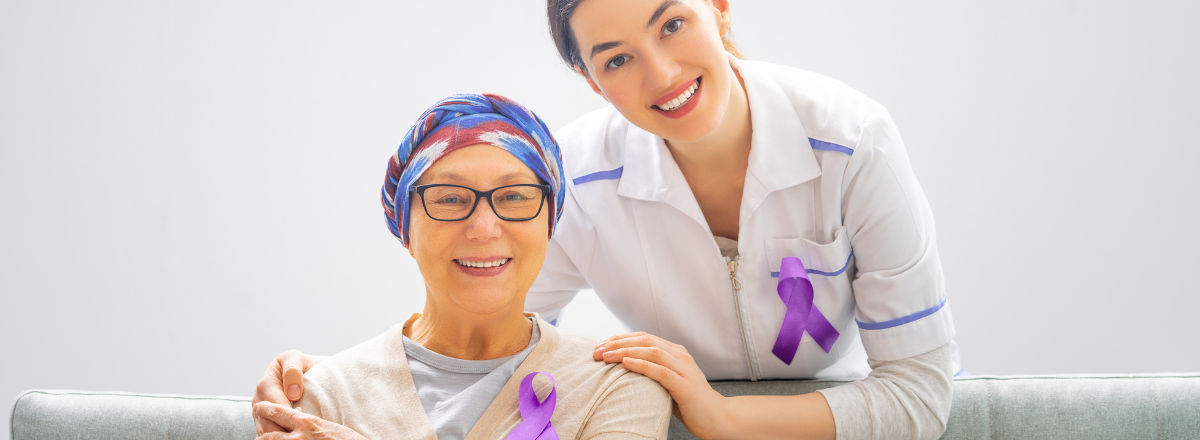Cancer accounts for 1 in 4 deaths here in the UK, which is why raising awareness for early signs and symptoms is so important. ‘As a general rule, the earlier cancer is detected, the more treatable it is,’ says ZoomDoc GP, Dr Jenny Ellenbogen. But while many of us are getting better at recognising the warning signs for common cancers such as breast cancer, prostate cancer, bowel cancer and cervical cancer, there are other cancers that don’t get quite as much awareness. That’s why this March it’s time to talk about Ovarian Cancer, to raise awareness of the signs and symptoms that women, particularly the over 50s should keep an eye out for. Here’s what you need to know about this particular cancer, including how to reduce your chances of getting it.
What is ovarian cancer?
As the name suggests, ovarian cancer targets the ovaries, which are found on either side of a woman’s uterus. Although not as common as some cancers, it’s still the 6th most common cancer amongst women, according to Cancer Research UK, affecting roughly 1 in every 50 women. ‘It’s a lot less common than breast cancer, which affects as many as 1 in every 7 women, but many cases can be prevented if women know what to look out for,’ says Dr Jenny. That’s why it’s important to know the signs and symptoms so you can get a diagnosis and get treatment as soon as possible.
Signs and symptoms of ovarian cancer
Experts are urging women to recognise the B.E.A.T symptoms of ovarian cancer. This stands for:
Bloating that doesn’t come and go
Eating difficulty and feeling full more quickly
Abdominal and pelvic pain you feel most days
Toilet changes in urination or bowel habits.
‘Unfortunately symptoms of ovarian cancer can be misdiagnosed or easily confused with other problems, such as IBS, but if these symptoms are affecting you, talk to your doctor – especially if ovarian cancer runs in your family,’ says Dr Jenny.
The NHS also lists the following signs and symptoms of ovarian cancer. Talk to your doctor if you frequently (roughly 12 or more times a month) suffer with any of these:
- a swollen tummy or feeling bloated
- pain or tenderness in your tummy or the area between the hips (pelvis)
- no appetite or feeling full quickly after eating
- an urgent need to pee or needing to pee more often.
Other symptoms of ovarian cancer can include:
- indigestion
- constipation or diarrhoea
- back pain
- feeling tired all the time
- losing weight without trying
- bleeding from the vagina after the menopause.
‘These symptoms may well be nothing serious at all but it’s worth ruling out ovarian cancer so you can stop worrying, or at least get it diagnosed and treated to give yourself the best possible chance to fight it,’ says Dr Jenny.
Who does ovarian cancer affect most?
Ovarian cancer mostly affects women over 50, but anyone with ovaries can get it at any age. As with most cancers, your risk does increase the older you get, with more than half of all cases in the UK in those aged 65 and over. However, the risk disappears if you have your ovaries removed, for instance if you have surgery called an oophorectomy. If you have no ovaries you can’t get ovarian cancer.
According to the NHS, you’re also more at risk of getting ovarian cancer if you:
- inherited a faulty gene, such as the BRCA genes or those linked to Lynch syndrome
- had breast cancer or bowel cancer
- had radiotherapy treatment for a previous cancer
- have endometriosis or diabetes
- started your periods at a young age or went through the menopause late (over 55), or have not had a baby – because these things may mean you’ve released more eggs (ovulated more)
- have never used any hormonal contraception, such as the pill or an implant
- are taking hormone replacement therapy (HRT)
- are overweight
- smoke.
If ovarian cancer runs in your family, talk to your doctor about pre-empting it using hormones and the possibility of surgery to remove your ovaries before getting it. ‘Depending on your age, health and family history, this could be a conversation worth having sooner rather than later,’ says Dr Jenny.
Can ovarian cancer be treated?
Ovarian cancer can be diagnosed using scans or more invasive procedures such as a needle biopsy to look at cells from your ovaries or a laparoscopy to look closer at your ovaries.
If ovarian cancer is confirmed, treatment options include surgery and chemotherapy. How it’s treated will depend on what stage your cancer is and your overall health.
For more support with ovarian cancer you can always talk to:
- your GP
- Ovacome, the UK’s main ovarian cancer charity – providing support and information. Call 0800 008 7054 or 07503 682 311 or join their online forum.




